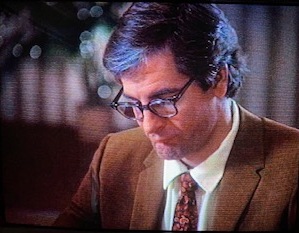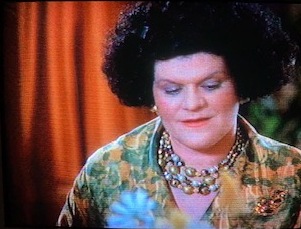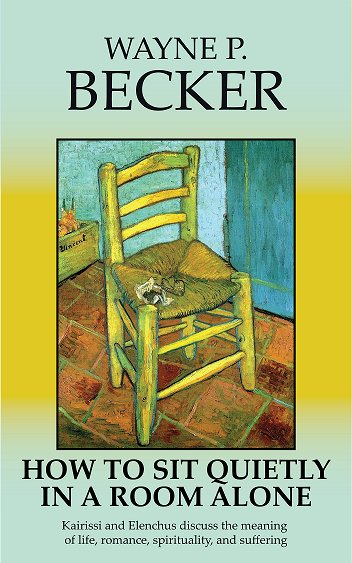|
Word Gems
exploring self-realization, sacred personhood, and full humanity
Editor's Essay:
Metaparadigm
| Your Life and Behavior will Change Naturally, Easily, and even Quickly, when Your Metaparadigm Changes |
return to "Metaparadigm" main-page
“You can't change the fruit without changing the root.” Dr. Stephen R. Covey

|
origin and development of the word 'metaparadigm'
“Paradigm” is from the Greek word paradeigma, which is comprised of two roots, “para” meaning beside, and "deigma" signifying model or pattern. The early idea seems to have been “to feature something side by side.”
“Paradigm” came to be associated with the study of grammar; but, more recently, since Thomas Kuhn’s 1962 book, “The Structure Of Scientific Revolutions,” the word has grown in popularity as a philosophical term.
Today, “paradigm” refers to a cognitive framework, a belief-system, a cluster of assumptions and ways of thinking. A paradigm is a lens, a filter, a prism through which we understand, process, and make sense of the world around us.
a total cosmic vision of reality
“Metaparadigm” greatly elevates the tone. “Meta” means higher or beyond. While “paradigm” might refer to particular tenets concerning a narrow area of interest, a “metaparadigm” is one's overarching assessment encompassing all aspects of life, including its nature, meaning, and purpose, with opinions on post-mortem survival, as well.
A metaparadigm is a total cosmic vision of reality. It gives marching orders to an array of sub-paradigms. A metaparadigm is the emotional-intellectual lynchpin, the cornerstone, the master blueprint giving meaning to, distilling, holding together all that you know, all that you believe that you are.
This doesn't mean that one's metaparadigm is accurate: the judge may be in error, but never in doubt.
|
Why do so many people cling to superstitious ideas, remain in mismatched relationships, or support oppressive organizations?
Why can't people change their views or their lives when new information is presented? - even when they know they should change and really want to change.

Think of the last time you argued with someone about politics. It turned out so well. You tried to point out that the elected official or the candidate advocated policies which were destructive to personal liberties and the greater good. You offered facts and figures, even first-hand testimony from the person in question, concerning intended malfeasance. Your listener tried to deny, minimize, or circumvent the evidence, but, as they say, facts are stubborn things, and your case could not be overturned. Even so, did your interlocutor change political parties or viewpoint on the strength of your argument? Very probably not. But why not?
Or maybe you were informing a friend that her church‘s doctrines were anti-humanistic, counter-Renaissance, would make Jefferson turn in his grave, created a view of human nature as servile and childish, and supported a bloated elitist hierarchy in its “pomp and revenue” ways. You politely added that the church's leadership had repeatedly been caught in sexual abuse and impropriety and, for other various untoward reasons, was a dark force in history. However, did you win your case? As prosecuting attorney for an enlightened view, your position should have caused much soul-searching for your friend. But, you remember too well the reaction: She won’t speak to you again now; says her church is not a cult but an upstanding force in the community and the world, and that you are an agent of Satan. Ok, then.
|
more than drinking the koolaid
The long reach of cultism encompasses much more than crackpot churches. The root idea of cult offers the sense of "cut." This core concept of "cut" leads us to images of refinement and refashioning and, by extension, development, control, pattern, order, and system.
Cultism as systemization finds a ready home in religion and philosophy which seek to regulate and redistill the patterning and ordering of ideas. However, in a larger sense, the spirit of cultism extends to every facet of society. We find it scheming and sedulously at work in politics, academia, family, corporations, entertainment, science, artistry – anywhere power might be gained by capturing credulous and fear-based minds.
See the “cultism” page for a full discussion.

|
Or what about materialistic science? Darwinism is built upon a creaky foundation of outdated, obsolete assumptions, some of which are based on Newtonian physics which has been superseded, for a hundred years now, by quantum mechanics. But this doesn’t stop the Darwin Lobby from inculcating young high-school and college minds with a materialistic paradigm. The Royal Society in London recently held a conference attended by hundreds of scientists from around the world for the purpose of updating and cleaning up Darwin’s act. Nobel-laureate status researchers have demonstrated how species actually change and evolve. – See many articles concerning these issues on the “Evolution” page. But those who lead the quasi-religion of Darwinism ignore this new research and keep right on preaching that anyone who doesn’t accept their tired and worn out party-platform “is either ignorant, stupid, or insane." How does this happen? Why don’t people change their “infallible doctrines” when new evidence is produced? Isn't that what science is supposed to do?
But, our favorite example of how people become bogged down in life, unable to change, lose their personal freedom, self-respect, and even their sense of self – is the ill-fitting relationship. They’re all around us, and we’re well acquainted with examples. I’ll pick one to talk about. Some time ago, I knew a young mom who was not with a husband. I wrote of her situation in the article concerning the so-called “curse of Eve.”
[She’s] expecting her third baby in two weeks. The father is a hot-head, drinks too much, will soon be fired from his job, and has treated her abusively; yet, against her own better judgment and stated plans, she often visits him and "tries to make things work."
The single mom just phoned, and I paraphrase:
"He [the father] just won't stop drinking! I don't know why he won't just be happy with me. I know I should not see him as he's so destructive in his behavior, but I just can't let him go. I need him too much!"
Thoreau’s “quiet desperation”
Among Ann Lander’s “miserably married,” while more common than we might suspect, cases of physical abuse afflict the minority. Far more prevalent, however, is what Thoreau called the life of "quiet desperation.”
It happens when she "settles," when she marries a guy with a streak of jerkiness. Well, we all have streaks of jerkiness, but her main problem is that she's with someone so not like herself. His special brand of jerkiness, in the main, was kept out of sight - “best foot forward,” you know - during the probationary dating period. However, she really did know, women aren’t stupid and have the best factory-installed radar, but she wanted this too much and made excuses for him. Mary outlines the dilemma in her wedding-day soliloquy.
That was a while ago, though, and now Mary is left to wonder how she ever got into this mess, how she managed to end up with someone so antithetical to and incommensurate with her own sensitive nature:
|
Quantum Leap (1989), episode “Camikazi Kid”
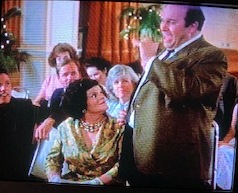
(mother-in-law to be, very annoyed) "You're late! On the day of the wedding you won't know what to do."
"Ahh, of course I'll know -- drink heavily." (as he indulges in a self-congratulatory big horse-laugh)

(onstage now) "Everybody listen up! I'd like to thank the most important person here -- the wine waiter!" (guffawing uproariously at his own feckless attempt at humor)
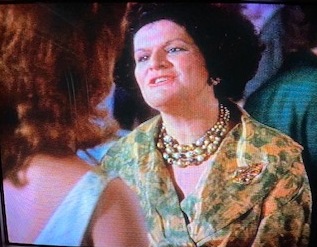
(apologizing to the bride) "I'm so sorry, Dear. He just started celebrating a little early." Uh-huh.

The bride sighs deeply as she endures being kissed, inappropriately, right on the lips, by the goonish father-in-law to be.
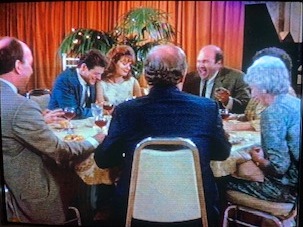
Later, not yet having gotten over himself, the boorish fellow resolutely tinkles the wine glass and subjects his captive audience to still one more lame off-color joke:
"... and then she said, of course, you can, that's where lawyers come from." (again, so thrilled with his own elevated social IQ)
Editor’s note: Notice how people hide with their eyes; notice, too, the constrained terror and bridled panic of the poor mother-in-law. The most insufferable aspect of the consummate boor is not that he fancies himself as so clever – which is common fare for his species – but that he is convinced all others readily pay homage as well... Please, which way did you say the exit was?
|
If you, as an objective third-party observer, were to discreetly approach this hapless Mary-as-mother-in-law, you might admonish:
“Honey... why do you do this? It’s so obvious to everyone – maybe, except to you – that you are chalk-and-cheese with him. He is so unlike you, so not you! Why do you stay? Why do you put up with this? Can't you see you're dying? You're not like your old self now. Do you even know who you are anymore? Don't live your life running the clock out. Why don’t you get yourself a real life and just start over again? It's not too late!”
It's never too late to live authentically. But, if you actually confronted Mary with these pointed questions, more than likely she’d be offended, and not a little.
- Jesus, in The Book Of Thomas: "Blessed are those who allow themselves to be disturbed."
Like a flustered press secretary, she’d be scrambling to put together some semblance of reality control: “He’s not as bad as you say! John is a good man and has always provided for the family and has given us a good life.”
I see.
“he's a good man”
Elsewhere, we’ve discussed that whenever a woman speaks from a script with “he’s a good man,” but says not a word about the affective domain of her marriage, you can be absolutely certain that what this Mary is really saying is, “I don’t love him, and never really did.”

|
"Richard... is a good man... and you've been gone a long time."
"I'm sorry I left you, Lois."
Editor’s note: Don’t worry about it too much, Supe - just notice what she didn’t say.
|
“Quiet desperation" - it’s another way of exclaiming, “I’m living like a zombie, it's hard for me to feel anything, this is not what I signed on for, not the way I thought it would be, and it’s been so long since I felt good, I don’t even know what that means anymore.”
Is anything more hurtful than this, the loss of one's own sacred self? And yet, though many of these walking dead trudge through mortal existence simply trying to run the clock out, most are still unwilling -- or unable -- to change.
Summarizing her decades of marital counseling experience, Ann Landers once bemoaned: "The poor wish to rich; the rich wish to be happy; the single wish to be married; and the married wish to be dead."
Why is this?
sometimes, if things get really bad, people might finally agree to change – sort of, but not really
Think back to my friend, the single mom, with the drinking paramour. We all know that many women who are beaten still refuse to leave the perpetrator. However, sometimes, with incidents of black eyes and finger-marks on the neck becoming more numerous, she might finally make a change.
“jumping from the frying pan into the fire”
However, this old English proverb tells us what is likely to happen next. When she leaves the violent one, does she end up with a nice guy who treats her respectfully? It could happen, but we’ll be surprised if it does. There’s much street wisdom to suggest that she’ll go out of her way to find someone new who’ll continue to abuse her.
The single mom wants to change, knows she should – but is very conflicted and her desire for change is not deep enough. Like a moth drawn to a campfire that will consume, she seems helpless to avoid one more relationship of physical battering. It’s as if she believes herself to deserve punishment.
“I thank thee Lord that I am not like other men”
Here’s another disturbing example of partial and shallow change. This one bothers me quite a lot. In my readings and research I often discover a seemingly-wise spiritual teacher, a self-help counselor, or a cutting-edge scientist with humanitarian leanings. I can think of many of these, and their wisdom has benefited my life.
However, to my dismay, if one reads far enough or listens to several of their lectures, eventually they begin to make comments revealing a certain pride and arrogance, a spirit which exclaims “I am better.” In the “Forgiveness” article I referred to this slip of hubris, this attitude of latent totalitarianism, as “I thank thee Lord that I am not like other men.”
How does this happen? How can someone, authentically and sincerely, I believe, preach a gospel of egalitarianism and universal brother-sisterhood, and then, in the next breath, fall into lower levels of consciousness with “you’re not as good as me”?
the friendly neighborhood Nazi
I need look no farther than my own history for a frying-pan-to-fire example.
As I’ve recounted in another writing, when I was 17, my father’s growing frustration with my disagreement with the family religion led him to bring me before the “court” of the local pastor. This Blackrobe, I would come to judge, was one of the most evil persons I would encounter during my time on planet Earth. For my insubordination, my questioning, he would have killed me, if Jefferson’s rule-of-law in the form of the town sheriff were not nearby. This unpleasant incident proved to be a pivotal event for me. I became so angry, so enraged, by this injustice that I silently promised myself, right on the spot, that I would never allow this kind of assault to my person, ever again. I was now on my way out of the church, with no reconciliation possible.
Other family members, concerned for my “lack of faith,” lamented that if only I’d have spoken to the affable Father John, a near-relative, I could have found a way to quiet my questions and remain in the ecclesiastical fold. That’s probably true; but I now see that this would have merely forestalled a crisis. The root of my problem was still festering and active. What happened next was very similar to recidivist young moms with penchants for sequel batterings.
Having left the church of my youth, did I now seek out one with more enlightened doctrines, more equitable and merit-based governance? Well, I wanted to, at least I told myself I did; but, like the battered young mom making empty promises to herself, I found myself drawn to a new church which, in spirit and essence, was very similar to my childhood faith, was just as draconian, just as doctrinaire and totalitarian in its policies.
Editor's note: However, the larger question, which I was unable to ask in those early days, would have been, why did I need to be part of some group at all? Why this compulsion to be a joiner? READ
For a long time I wondered how this could have happened to me; indeed, all over again. But, as I’ve said, it took me most of my life to grow up - until age near-70, as I evaluate myself now. Before then, any changes or enhancements I attempted to make were more or less surface adornments, and didn’t reach deeply enough to the heart of the matter.

split-mind
The “Course In Miracles” purports to offer instruction in mind-training. Because it understands the difference between the “true self” and the “false self,” I count its teachings as credible.
The “Course” at times uses the term “split-mind.” By this it means to denote a process of the dual path. It's like this: As we make our way out of the darkness of the dysfunctional ego’s realm, we might occasionally catch a glimpse of our destiny. Usually, in the beginning, it’s quite fleeting. It’s a kind of “split-mind” perception: We’re not yet firmly on the path of eternal life, but, now and again, the heavens open and the briefest cognition of reality accosts us.
In those times of momentary sightedness, we can actually see what needs to be done in our lives. But until we’re able and willing to address a deeper, systemic change for ourselves, at a fundamental level of being, we cannot better ourselves in a permanent way.
“the absolute foundation of human knowledge”
The New Story Of Science ranks among the five most important books I’ve ever read. Several of its chapters I’ve summarized and featured in Word Gems articles.
Augros & Stanciu's
The New Story Of Science
George Stanciu, PhD, theoretical physics
Robert Augros, PhD, philosophy
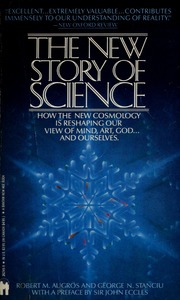
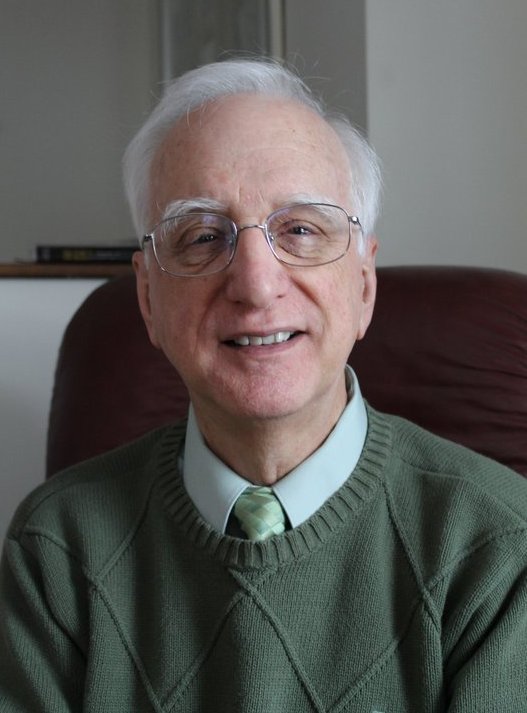 |
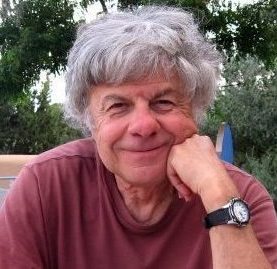 |
| Robert M. Augros |
George N. Stanciu |
In the final chapter of The New Story Of Science, the authors employ the phrase “the absolute foundation of human knowledge.” When I read this I was stopped cold. I knew I wanted to say something about this profound concept; the result came to be this article on “metaparadigm.”
What is “the absolute foundation of human knowledge”?
 Rene Descartes (1596 - 1650)
Descartes was on the right track and almost had it. He was looking for something rock-solid on which to build an intellectual life. Everything could be doubted, he mused, but there’s one thing he was certain could not be doubted – his own thoughts: “I think, therefore I am.” His own thinking offered irrefutable evidence, he judged, that he, in fact, existed and was not part of a dream.
Rene Descartes (1596 - 1650)
Descartes was on the right track and almost had it. He was looking for something rock-solid on which to build an intellectual life. Everything could be doubted, he mused, but there’s one thing he was certain could not be doubted – his own thoughts: “I think, therefore I am.” His own thinking offered irrefutable evidence, he judged, that he, in fact, existed and was not part of a dream.
So far so good.

Jean-Paul Sartre (1905 - 1980)
However, three hundred years later, another philosopher would challenge Descartes’ assertion. Mere thinking, contended Jean-Paul Sartre, is not the bedrock of one’s reality: "The consciousness that says 'I am' is not the consciousness that thinks."
There are very few who understand what Sartre is talking about. Descartes was wrong, Sartre was right. The elemental, essential underpinning of one’s reality, "the absolute foundation of human knowledge," is not mere thinking but something else, something deeper than ordinary thought.
|
the moment of becoming a sane, really free, human being
“I'm simply saying that there is a way to be sane. I'm saying that you can get rid of all this insanity created by the past in you. Just by being a simple witness of your thought processes. It is simply sitting silently, witnessing the thoughts, passing before you. Just witnessing, not interfering not even judging, because the moment you judge you have lost the pure witness. The moment you say ‘this is good, this is bad,’ you have already jumped onto the thought process. It takes a little time to create a gap between the witness and the mind. Once the gap is there, you are in for a great surprise, that you are not the mind, that you are the witness, a watcher. And this process of watching is the very alchemy of real religion. Because as you become more and more deeply rooted in witnessing, thoughts start disappearing. You are, but the mind is utterly empty. That’s the moment of enlightenment. That is the moment that you become for the first time an unconditioned, sane, really free human being.”
Osho, Indian mystic (1931 - 1990)
|
Are you able to become aware of your own thinking? This moment, can you mentally step back and silently witness the thoughts in your head? If so, are there two of you?
Descartes said that the thoughts in the head constitute bedrock reality. Sartre said, no, there’s another part of you, the essential you, that knows “I am,” “I exist," and this part of you is not doing what passes for thinking in the ordinary manner. Osho said that once we sensitize ourselves to this dichotomy, and are able to perceive the “gap” between the silent witnessing presence and the thinking mind, we will have accessed “the absolute foundation of human knowledge.”
Are there two of you?
There’s one real you, and one imposter.
The silent witnessing presence is “the true self.” It is the sacred soul, the real you. It's the part of you that knows it's thinking.
The chattering in the head, the “monkey mind,” the thoughts that will not shut down, is “the false self.” It is the dysfunctional ego, which was given to us to create individual personhood; but, without restraints, it will take us over and ruin our lives.
No lasting change, for the better, to one’s behavior or life-situation, can occur within the domain of the ego. Real change takes place only on the level of “the true self.”
Minor changes and tinkering, minor paradigm displacement and adjustment, can happen for the ego. But the kind of change we’re looking for, the kind that permanently advances us spiritually and puts us on the road to our Summerland destiny, the kind that allows us to find our eternal romantic Twin Soul, will require a few dollars more -- nothing short of a massive metaparidigm shift.
|
feedback loop, broken compass, endless iteration
Editor's note:
The ego's orientation of one’s person is like a hidden homing device, or maybe a computer program in endless feedback loop, or a broken compass. It will consistently point you in a certain direction, position you for particular outcomes, set you up for predictable conclusions - despite changing circumstances at the surface of being. It’s as if you’re helpless to effect a real difference in your life, because… whatever the dial on one's secret compass points to, it's stuck there - the ego needs it too much.
A Course In Miracles: "The ego’s characteristic busy-ness with nonessentials is for [the] purpose [of distraction]… [In these] diversionary tactics ... the one question never asked [is] ‘What is the [fundamental] purpose?’ Whatever it is, it will direct your efforts [silently, imperceptibly, and] automatically. When you make a [fundamental] decision of purpose, [it] will remain in effect unless [or until] you change your mind.” It's like setting your computer to endlessly play one song - there'll be no other music, until you change the setting.

|
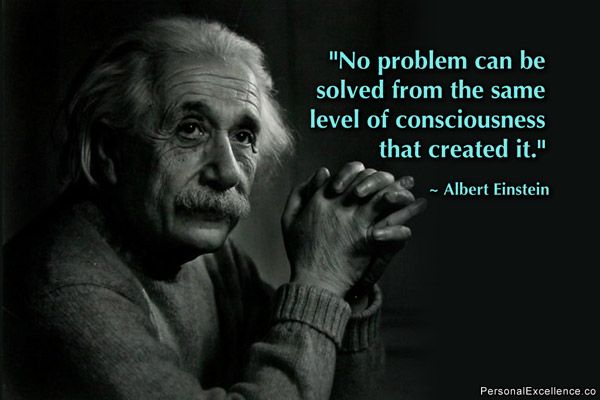
|
Editor's special note:
accessing your real life within is like moving a house
It was the summer of 1958, and I was so excited. I'd just completed first grade, and I was proud of my accomplishment, but this – this! – was really different. Dad and Grandpa were moving the old white farmhouse onto a brand new foundation, with a big new basement for playing in.
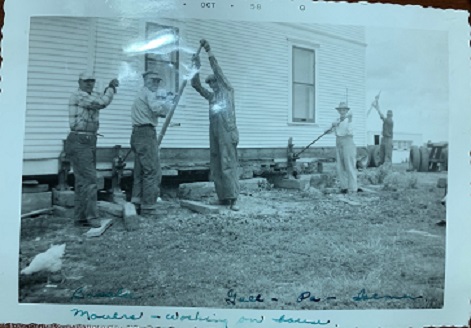
There’s Grandpa, second from the right. He’s working one of the jacks. This is all so amazing to me, a little kid. I never dreamed you could lift up a house! And right by the workman on the left – it’s hard to see it now, but – there’s an opening in the foundation, and rabbits and gophers would hide in there, and I always wanted to crawl in to get them, but the opening was too tight. But now suddenly I could, but Grandpa won’t let me get close. Anyway, look at that chicken in the lower left-hand corner, nonchalantly strolling by. That always makes me laugh.

My cousin Rickie from out-of-state just visited, and we climbed down into the new basement and threw dirt balls at each other and lit firecrackers, so much fun.

I myself took these three photos of the move. Mom gave me her old 1940s Kodak box camera. I still remember very much wanting these pictures. A few years later, though, Dad said the whole moving job was way too expensive, and we’d have been better off building from scratch. Dad’s a good manager and one of the most successful farmers in the area.

My birthday landed right at the time of the big move. Mom never forgot to make a big deal out of birthdays. And I always smile today when I see the faithful scribe, Mom’s photo annotations. Defying conventional rules of grammar, and even logic, Mom writes “me", a personal pronoun but without clear antecedent, a "me" which is not me but Mom. Psychologists tell us that little children have to learn to mentally dissociate themselves from a mother; early on, a kid's sense of self is closely linked to, and even indistinguishable from, a maternal caregiver. And I think that Mom, insisting on “me,” as silent Greek chorus to my person, is exhibiting subtle signs of difficulty letting me grow up. I finally understand, but as an older teen, needing his freedom, I was sorely tested - and often failed the test - by her smothering superintendence. Nevertheless, there’s also a good side to this strained sense of “me.” Her voice, living in my head, was my conscience for a long time, I did well with it, made my way forward; yes, for a long time, as training wheels, I exhibited the courage of my mother's convictions.
|
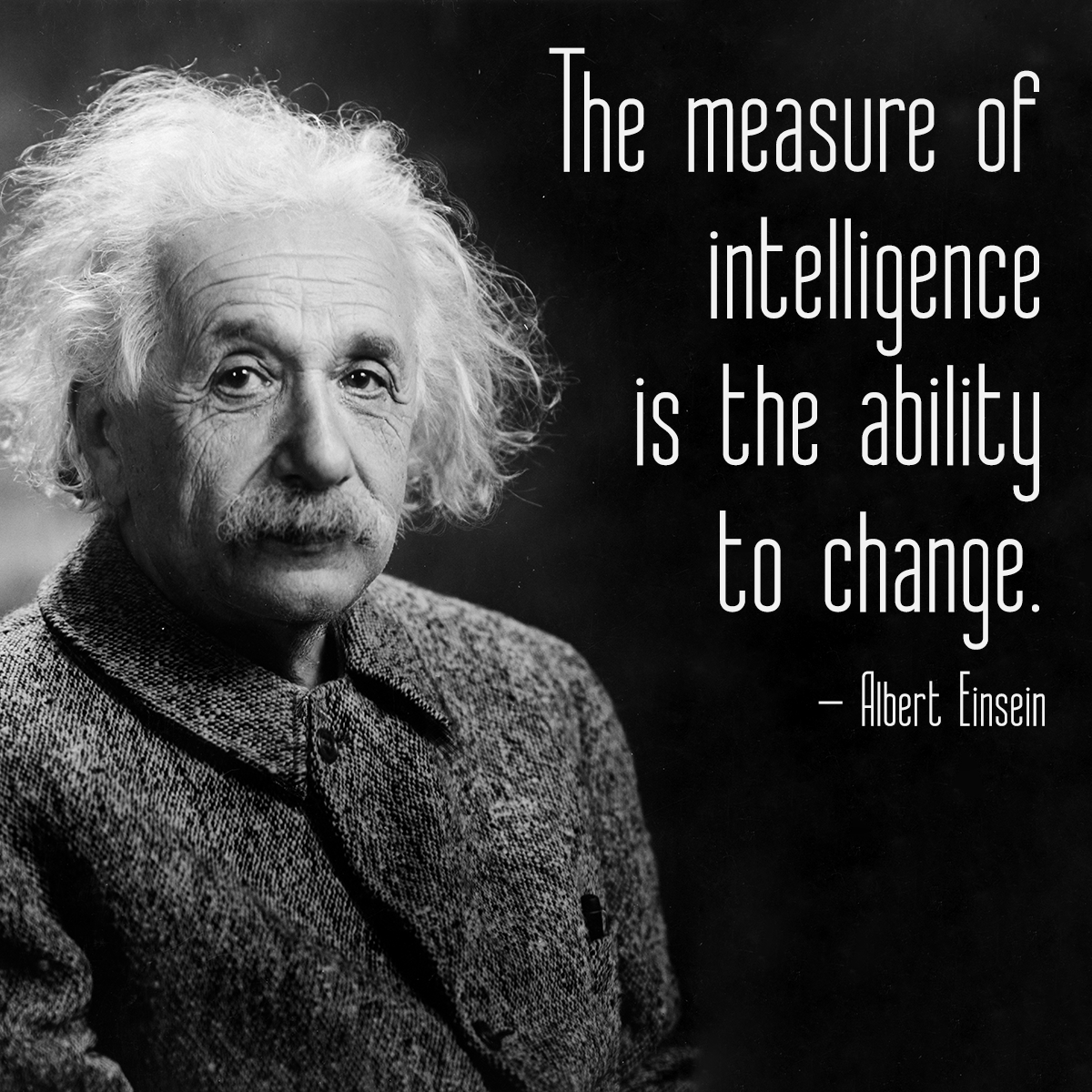 taking architectonic inventory, exploring the structure of the true and false self: what a metaparadigm shift really means
“Architectonic” relates to design and structure. The prefix “archi” means “first” or “chief.” And so, an architectonic inventory is one that searches for essential and primary elements. To change one’s behavior or life-situation, I mean, real fundamental change, such that you yourself know that you’re a different person now, will require getting right down to the rivets and two-by-fours of what you're really made of.
But merely witnessing and becoming aware of the rivets and two-by-fours is not enough. Once we see the architectonic structure, we need to move it -- like moving a house -- onto a new foundation.
A metaparadigm shift, so to speak, is moving the essence of our persons onto a new foundation. Right now, for the unenlightened, we've constructed our lives on the foundation of the "false self." We need to move our "house," all that we believe ourselves to be, onto a new foundation of the "true self."
taking architectonic inventory, exploring the structure of the true and false self: what a metaparadigm shift really means
“Architectonic” relates to design and structure. The prefix “archi” means “first” or “chief.” And so, an architectonic inventory is one that searches for essential and primary elements. To change one’s behavior or life-situation, I mean, real fundamental change, such that you yourself know that you’re a different person now, will require getting right down to the rivets and two-by-fours of what you're really made of.
But merely witnessing and becoming aware of the rivets and two-by-fours is not enough. Once we see the architectonic structure, we need to move it -- like moving a house -- onto a new foundation.
A metaparadigm shift, so to speak, is moving the essence of our persons onto a new foundation. Right now, for the unenlightened, we've constructed our lives on the foundation of the "false self." We need to move our "house," all that we believe ourselves to be, onto a new foundation of the "true self."
|
Editor's note:
"if I build again the things which I destroyed"
My Galatians commentary represents a 15-year research project. The following, from Galatians chapter 2, was written 20+ ago.
2. 18-19. For if I build again the things which I destroyed, I make myself a transgressor. For I through the law am dead to the law, that I might live unto God.
the things which I destroyed. In the context of the present discussion of justification, Paul’s somewhat cryptic phrase here, likely, refers to his previous life-style, the time when he was focused on the law. But this mind-set was abandoned when God’s grace touched him (1. 13-16). Like a man dynamiting his own house, Paul destroyed his own mental paradigms of God and life, carefully constructed since boyhood – he had totally rejected legalism.
When I originally wrote this, I’d not yet learned about the “true” and “false self.” I was still a fundamentalist Christian. See my prefatory comments to the Galatians commentary.
However, in retrospect, today I marvel at my prescient use of the words “paradigm” and “house.” I was saying more than I knew but somehow got this right.
By chapter 5, Paul is talking about “life in the Spirit,” a new orientation built upon an awareness of human essence connected to God, Universal Consciousness. He’d “destroyed” the old estimation of himself, a requirement to find personal significance in religious legalism. See a full discussion in the commentary.
|
Oneness vs Separateness:
the two foundations
Our analogy of the two foundations might be helpful, but all analogies drift from a referent and easily break down as we analyze them more closely.
The “true self” as foundation of our spiritual lives, unlike foundations in the world of brick-and-mortar, does not have to be built, as such, but only acknowledged and realized. It’s always been there, it’s there this moment, and shall be, for all eternity. Our “foundation,” our connection to God, has never vaporized, and never will. Our problem is that we’ve been totally unaware of it.
the ego's not such a bad guy, just misunderstood
We speak of the “false self” as if it were some bad guy. Actually we need this “dysfunctional ego." The ego is just our developing sense of individualization and autonomy. We require this focus on self to become whole persons in our own right. The “Course In Miracles” has much to say about the ego, and I will suggest that you learn more about this. However, while the ego has healthful and needful functions for our evolving self, we must learn to assess it as the developmental stage that it is and not take it to be the authentic self. Many Word Gems articles discuss this most important issue, and I will refer you to these for more information.
However, for our particular purposes at hand, we want to know how the true and false selves affect us in terms of changing one’s behavior and life.
the ego forms the metaparadigm of the unenlightened
The “Course In Miracles” suggests that this entire area of spiritual “mind training,” as it uses the term, might be reduced to a few important concepts; probably, the most salient of which is that the ego believes itself to be separate from God. This is an illusion, but a very persistent one - and it will form the metaparadigm of those burdened by it.
- “You can't change the fruit without changing the root.” Dr. Stephen R. Covey
The ego, as developmental stage, was allowed in order that we build our own sense of personhood. However, it’s not where we want to live for all time. Eventually, sooner rather than later, we need to awaken to the fact that the ego has been masquerading as the “real self.”
the root of all trouble and evil in the world
What does this mean? When the ego runs our lives, we will look at all the universe through the lens and filter of “I am separate from God.” This core idea, or maybe we should call it the "core fear," is the root of all trouble and evil in the world. When people feel separate, they count themselves as “not enough,” needy, and bereft, and then all others become potential enemies in competition for, what the ego believes to be, scarce resources everywhere.
Below, I’ve created a few inset-boxes which highlight the conflict between a spiritual foundation built upon oneness versus separateness. Many more dialogue-examples could be added, and you’ll be able to conjure your own.
the subliminal, but very real, self-assessment
|
|
Oneness with God: “I have enough, and I am enough, because God created my sacred self ‘in the image’ and therefore it's perfect.”
Separateness from God: “I don’t have enough, and I am not enough, because I’m defective by nature and prone to failure.”
|
|
|
|
Oneness with God: “I am one with God, connected to all others as well, plus all creation, and so I feel loved, complete, and whole. I have a sense of 'fitting in' and that I'm 'at home,' wherever I go, because God is with me.”
Separateness from God: “I am separate from God, all alone in the universe, and therefore I feel God could never love me, nor could anyone else, and so I feel empty. If someone compliments me on something, I get agitated and nervous because I'm so undeserving.”
|
|
|
|
Oneness with God: “My connectedness with God makes me feel safe and secure, and even when things go wrong at the surface of life I still know an inner peace.”
Separateness from God: “My separateness from God makes me feel afraid. There’s a low-level sense of fear and guilt in my spirit which never really goes away. It’s even worse than that. I feel guilty all the time, and don’t even know what I’m feeling guilty about.”
|
|
|
|
Oneness with God: “I look forward to the future so much. My heart is bursting with optimism and joy for what lies ahead, all the opportunities for growth. I’ve heard the next life is pretty good, but I don’t really need others’ reports on that, I can feel deep within that God is preparing something wonderful for me and for all of us.”
Separateness from God: “I dread the future. I wake up in the morning wishing I didn’t have to face another day. I have nothing really that gives me happiness in this world, other than a few cheap thrills now and then. I’m scared of dying, I’m afraid there’s an angry god waiting to punish me for not measuring up.”
|
|
|
|
Oneness with God: “I’m not always happy like Polyanna because happiness is dependent upon happenings, the uncertain external factors of life, but even when things go wrong I always feel an underlying joy in my heart, just to be alive. It's all good.”
Separateness from God: “It’s been so long since I’ve felt fine that I’ve forgotten what it’s like to feel good. I don’t even expect happiness anymore. Truth is, I just feel bad most of the time and am pretty much fed up with everything in this world."
|
|
|
|
Oneness with God: “My spirit tells me there’s an abundance of all good things in the universe. I feel that I’m looked after as I go through life. Things I need always seem to show up at the right time; and if they don’t, then I realize I probably didn’t need them. I just try to do my best, and with that, I really don’t worry about anything.”
Separateness from God: “There’s scarcity everywhere. The glass is always half empty, I'm always afraid of not having enough. It’s me against all. I don’t trust anyone, everyone’s a potential enemy, and I have to fight for everything I get in life. But even when I win, there's never any joy in it. A sense of dread and anxiety never altogether leaves my mind.”
|
|
- A Course In Miracles: “The ego does not recognize the real source of ‘threat,’ and if you associate yourself with the ego, you do not understand the situation as it is... The ego's decisions are always wrong because they are based on the [metaparadigm-assumption] error [of separation from God. With a view of separation in place, then] nothing the ego perceives is interpreted correctly."
|
errant metaparadigm produces scores of other errors
Augros and Stanciu: “But a mistake in world view [that is, metaparadigm] is much more grave than a false hypothesis [in science]. An error in a particular conclusion within one science is a [relatively] minor evil... But the worst of all is an error in world view [that is, the errant metaparadigm] because it influences the methods of all sciences as well as the attitudes and expectations in the arts, politics, religion, and every other phase of culture. A mistake in world view is necessarily an architectonic error, producing scores of other errors… [The invisible, subtle, but far-reaching, influences of the metaparadigm] set up the assumptions about the mind, the body, and the universe with which we begin; pose the questions we ask; determine the interpretation we give these facts; and direct our reaction to these interpretations and conclusions.”
it's the most dangerous and far-reaching error because it leads our assumptions, expectations, interpretations, and conclusions
|
change is not real change if the underlying neediness remains
Let’s briefly look at specific examples to see how the “false self” makes it impossible to fundamentally change one’s life and behavior.
 Again, not to say that some changes cannot or will not be made if people suffer enough, but we want more than just shifting from one focus of neediness to another; what we want is a “deep cleansing” change, one that accesses the joy of God’s mind:
Again, not to say that some changes cannot or will not be made if people suffer enough, but we want more than just shifting from one focus of neediness to another; what we want is a “deep cleansing” change, one that accesses the joy of God’s mind:
The single mom: She is afraid of being alone, of not being wanted, of being left on the shelf. A neurotic need to be accepted and valued often beguiles her into allowing a dangerous person into her bed and household.
Materialistic Darwinists: Even though the greatest scientists of history assert that consciousness, not matter, is the ground of reality, materialists continue to preach an obsolete and errant theory. At the root of this cultish intransigence lurks a classic example of the fear of death.
The mother-in-law at the wedding rehearsal: She averted, and rolled, her eyes once too many times during the gathering to convince anyone that she’s happy. She's afraid of leaving him, afraid of being on her own, afraid of what family and church will say, afraid of confrontation, afraid of being called a failure. She needs this too much, and it’s fast destroying her.
|

she hasn't got the faith or the guts to leave him
when they're standing in each other's way…
you know you've been wrong and it won't be long
before you leave 'em all far behind...
|
Editor’s note: I knew an aged couple, now passed on. He was well past 80. She would comment, a kind of boast, that every day he would say that he loved her. When I heard this, it just didn’t feel right, as they displayed no fervent mutual affinity. For example, he’d speak of accomplishments in his life, which prompted her to leave the table, unable to hear them one more time. All this drama, and with guests present, as well. I was talking to him one time, and the conversation turned to his ownership of a small but somewhat run-down house; a rental, he said, but the house was vacant. But then he confided the real nature of things. He said he kept that little house just in case he could no longer stand living with her one more day. It was his “get away” house. Now, those of us who are younger would think, “Well, this very senior couple gives the appearance of having learned the art of marriage congenialities. And, in any case, given their age, they would surely be well settled in for the duration.” But, not so. Even as he approached 90, he was still eyeing the exit, weighing the pros-and-cons of making a break one of these days, when he just couldn’t take it anymore.
The pastor as part-time Nazi: He’s played the aloof supremacist for so long that he doesn’t know how to react in a civil manner when someone asks meaningful questions about his doctrines. He’s a sad character really, the “inner child” for him cringing in the dark, lest some realize, despite his foaming bluster, that he has no authentic power in the world; worse and more frightening for him, as Kierkegaard would have said, he's utterly afraid that others will notice that he lacks an authentic Self.
We could go on; but there’s no need to. Once you perceive how this dynamic works, it’s fairly easy to sense what motivates those who have not yet “moved their house onto a new foundation.”
Those who have not yet awakened to the “true self” live in constant inner upheaval led by metaparadigm perceptions of “I don’t have enough” because “I am not enough.” This need not be. We have a true home totally ready for us, just awaiting the foundation placement.
This book offers advice on how to access the "true self." Moving one’s “house” to a new “foundation” is not so hard to do.
Everything that has a beginning is also subject to an ending.
But there exists a domain beyond the reach of time’s degradation. There, things simply exist, eternally, have always been, have no opposite, no duality, and do not suffer loss.
However, the ego has dominated for all of our lives and will not surrender its domain in a day. It will fight to keep its powers of deception, as entrenched mental habit patterns do not die easily.
This acknowledged, the ego cannot stand against the onslaught of a mind intent upon opening itself to the Light. Success is guaranteed. Sunlight is the best disinfectant. And when we "move house" to the new foundation we'll be surprised at how naturally, easily, and quickly, even life-long character blemishes might fade away. There's nothing to support them anymore.
The “Quiet Room” book can be a help with the process.
|
Editor's last word:
Spirit-Guide Margaret informs us that the very essence of Summerland’s pleasure will be found in one’s romantic relationship with a Twin Soul.
These destined couples, eternal darling companions, are virtual mirror images of each other, but not necessarily on the level of the body, nor the personality, but primarily the soul, the deepest inner person.
This sacred sanctum of the “real you” is meant to find nexus with your authentic mate. But you won’t be able to do this – even to find or recognize her – until you first find yourself.

|
Editor’s note: For more discussion on effecting real change, see on the Krishnamurti page 100+ synopses of his lectures.
Here’re examples of Krishnamurti lectures:
involuntary, radical, personal transformation
08.Feb.1959. To uncover the self, the whole structure of the self, there can be no authority, no guru to teach. There must be no condemnation of what you see in yourself but mere observation. When we observe anything, we immediately give it a name, cover it with symbol, translate it in terms of what we know. We do the same thing when we look at ourselves. What we need is a non-evaluative, non-interpretive mind. A mind set free from the chains of memory will involuntarily come to a state of quietness, alertness, and it is only then that radical personal transformation might occur.
choicelessly witnessing one's own confusion summons its own action, commencing the real revolution
08.Mar.1959. To see that the mind is confused has far greater significance than what to do. Most of us think that self-knowledge is a matter of information, of why the mind is confused. But there is no answer, no way out of its own confusion, because whatever way it thinks, it will still be confused. We must perceive directly. I must see that I am confused, that I have a vested interest in some system, ideology or belief. This very perception is enough in itself as it brings about its own action, which is the real revolution.
|













